syria
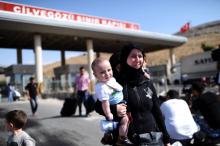
When a head of state is responsible for the deaths of 100,000 of his people and has used chemical weapons against innocent civilians — the world needs to respond. In one massive attack, the evidence appears to show that 1,429 people, including 400 children, suffered horrible deaths from chemical weapons banned by the international community. That is a profound moral crisis that requires an equivalent moral response. Doing nothing is not an option. But how should we respond, and what are moral principles for that response?
For Christians, I would suggest there are two principles that should guide our thinking. Other people of faith and moral sensibility might agree with this two-fold moral compass.

As the Obama administration considers a strike in response to recent chemical attacks, the head of a global evangelical group said Wednesday that Christians in the Middle East oppose military intervention in Syria.
“There is major consensus amongst the Christian leaders in this region that any military intervention would have a detrimental effect … on Christians in Syria,” wrote Geoff Tunnicliffe, secretary general/CEO of World Evangelical Alliance, in a letter to the State Department, the White House and the United Nation’s Security Council.
![Pope Gregory the Great, Carlo Saraceni [Public domain], via Wikimedia Commons Pope Gregory the Great, Carlo Saraceni [Public domain], via Wikimedia Commons](https://sojo.net/files/styles/medium/public/blog/Gregorythegreat.jpg)
As I began my morning devotions on Tuesday this week, Syria was on my mind. No surprise, right? The debate about whether to respond militarily to the use of chemical weapons is all over the news right now. Mostly folks are arguing about what actually happened and the larger geopolitical questions that a military strike involves, which are important and necessary issues. But here’s the question that was rattling around in my head as I turned to the day’s devotional readings on universalis.com: How does one respond to violence without becoming as guilty as the perpetrators you seek to punish?
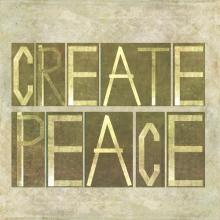
As the United States prepares to “officially” become involved in the Syrian war, Christian pacifism has reemerged as a much-discussed and relevant topic. Unfortunately, the concept has been somewhat misrepresented, undervalued, and often downright demonized within evangelical communities.
Critics often assume Christian Pacifism is some sort of radical political movement associated with marijuana-smoking hippies who are anti-government conspiracy theorists. To make matters worse, pop-culture (and much of Christian culture) has made pacifism seem, well, passive — as if pacifists are unpatriotic and un-American heretics who refuse to enlist in the military and avoid physical confrontations at all costs. They are characterized and perceived as weak, scared, and gutless.
In reality, the beliefs that form Christian pacifism are spiritual and scripturally founded around the life of Christ. And whether you agree with the theology, it’s hard to passively dismiss the Biblical argument for pacifism as some sort of crazy mumbo-jumbo.
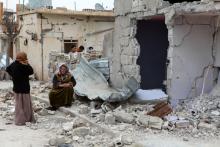
What’s happening in Syria is awful. You see the pictures and your heart breaks. It’s horrific. Lakhdar Brahimi, U.N. special envoy to Syria, said Wednesday that, “With what has happened on the 21st of August last week, it does seem that some kind of substance was used that killed a lot of people: hundreds, definitely more than a hundred, some people say 300, some people say 600, maybe 1,000, maybe more than 1,000.”
The Huffington Post has a slider with the title, Syria War In August (Warning: Graphic Images). Of course, every life matters, but as a father with three young children, seeing the picture of a Syrian man crying out in pain as he carries the body of a young girl – words fail.
Violence and Justice
My wife knows that we promote nonviolence at the Raven Foundation, and that I lean toward pacifism. Wednesday night, as we discussed Syria and Bashar al-Assad’s continued threats of violence, she asked me, “Well, what do we do if a government uses chemical weapons against its own people?”
The question haunts me. These are times that try the soul of anyone committed to nonviolence. We all want justice. We all want the violence to stop. We don’t want any more people to cry in pain as they carry the body of a lifeless child.
And so President Barack Obama seems to be ramping up the war machine. Ironically, as he plans for possible military strikes, on Wednesday he delivered a talk honoring the 50th anniversary of Martin Luther King Jr.’s speech “I Have a Dream.” As we hear the drum beat of war, we are reminded of King’s dream of justice. In his speech King said:
We must not be guilty of wrongful deeds. Let us not seek to satisfy our thirst for freedom by drinking from the cup of bitterness and hatred. … We must not allow our creative protest to degenerate into physical violence. Again and again, we must rise to the majestic heights of meeting physical force with soul force. … [We] will not be satisfied until justice rolls down like water and righteousness like a mighty stream.
Our popular understanding of “justice” is mired with violence. For King, true justice was always based on love and nonviolence, because violence always carries with it a fatal flaw. As he wrote in his book Strength to Love, “Violence brings only temporary victories; violence, by creating many more social problems than it solves, never brings permanent peace” (18).
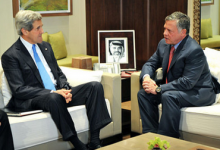
Pope Francis and Jordan’s King Abdullah II reaffirmed that dialogue is the “only option” to end the conflict in Syria, just as the United States and its European allies consider launching a military strike against the regime of President Bashar al-Assad.
The two leaders met for the first time on Thursday at the Vatican. The pontiff and the king, accompanied by his wife Queen Rania, talked in private for 20 minutes.
According to an official Vatican statement, during the meeting “special attention” was given to Syria’s “tragic situation.”
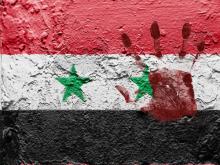
As the Obama administration readies for a probable military strike against Syria, Religion News Service asked a panel of theologians and policy experts whether the U.S. should intervene in Syria in light of the regime’s use of chemical weapons against civilians. Would the “Just War” doctrine justify U.S. military action, and what is America’s moral responsibility? Here are their responses, which have been edited for clarity.
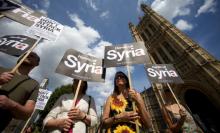
On Wednesday, President Barack Obama said that if Bashar al-Assad used chemical weapons against innocent civilians, there must be “international consequences.” The president is right. But what should those consequences be?
The issue here, again, is one that we have not decided how to deal with: terrorism. The definition of terrorism is deliberate and brutal attacks upon innocent people — whether by individuals, groups, or heads of state. By that definition, Assad is a terrorist. And terrorists who possess weapons of mass destruction and demonstrate their willingness to use them are most dangerous ones. But how should we respond?
I am in in the U.K., where political leaders last night backed off the decision to make immediate “military strikes” while the U.S. and other nations are considering them. The feeling here is that international and legal legitimacy need to be established first, that the U.N. inspectors should finish their examinations in Syria before any actions are taken, and that all other means of response should be fully explored first. These are good decisions.
Why is there such public “war fatigue” in the U.K. and the U.S. in light of Iraq and Afghanistan — and why is that creating reluctance to more military action? Because wars and military solutions have FAILED in response to terrorism — failed to achieve what they were purported to do.
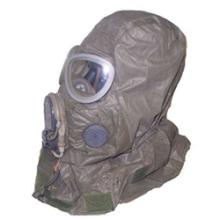
Fearful that Syria might retaliate against Israel if the U.S. launches a military strike, Orthodox Jews and others are demanding the Israeli government distribute gas masks that will fit over their beards.
In recent days, as Orthodox Jews and other bearded men have gone to distribution centers to retrieve their protective hood-like gas masks, they learned the government has only a limited supply, earmarked solely for the elderly and people with breathing problems.
Demand for protective hoods — as well as standard-issue gas masks — has soared since the U.S. administration confirmed that Syrian civilians were killed last week by chemical weapons.

As Syrian President Bashar al-Assad uses chemical weapons at the outskirts of Damascus and President Obama mulls a U.S. military response, some theologians hope for an alarming endgame to the 30-month-long Syrian conflict.
For these Christians and Muslim, the civil war in Syria heralds nothing less than the Second Coming of Jesus Christ.
Before you label the premise as a conspiracy theory, consider that there are a number of Muslim videos and several Christian websites — not to mention conservative talk radio shows — all making promoting versions of this unfortunate connection. And that’s wrong.
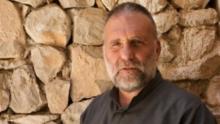
A prominent Italian Jesuit who is an outspoken supporter of the uprising against Syrian President Bashar al-Assad went missing in Syria Monday, fueling speculation that he has been kidnapped by an Islamist group.
The Rev. Paolo Dall’Oglio, 58, lived for three decades in Syria, where he established an ecumenical community at Mar Musa on the site of an early Christian monastery, engaging in interfaith dialogue with Muslims and forging close ties with the local population.
He was expelled in 2012 by the Assad government for his support of the rebels.
LIKE MANY Palestinians forced from their homes during the 1948 war, relatives of Jordan’s Sen. Haifa Najjar carried the keys to their Palestinian homes with them as they fled. These keys, passed down through generations, are powerful symbols of Palestinian ties to the land that international law considers theirs—even as their hope for return wanes.
As a Christian appointed by King Abdullah II to Jordan’s upper house of Parliament, Najjar is active in the education, environment, cultural, and legal sectors of the government. She is also superintendent of the Anglican-run Ahliyyah School for Girls and Bishop’s School for Boys in Amman, Jordan.
Within the mix of the 500,000 Palestinians who relocated to Jordan because of the Israeli War of Independence—or Nakba, “the catastrophe,” depending on who you ask—was a vocal minority of Palestinian Christians who joined their ranks with the existing Jordanian Christian community. Prior to 1948, Christians accounted for nearly 20 percent of the population of what is now Israel/Palestine. Today that figure is less than 2 percent. Even more dramatic are declines in the West Bank cities of Ramallah and Bethlehem. Christian populations are nearly extinct in these locations compared to their respective majorities of 90 and 80 percent prior to 1948.*
“They moved not as immigrants; they were initially thinking it was a temporary thing,” says Father Nabil Haddad of the Melkite Catholic Church in Amman. “It is similar to what Syrians are thinking right now when crossing the barbed wire, not the checkpoints, between south Syria and north Jordan.”

PRESSURE IS BUILDING for the United States to become militarily involved in the Syrian civil war. The result would be further bloodshed and destruction for the people of Syria, the worsening of an already grave regional security crisis, and U.S. involvement in another Middle East war.
The Obama administration has apparently decided to provide arms to the rebels. Sen. John McCain and others in Congress are calling for a no-fly zone and air strikes against Syrian government targets. The increased hard line comes in response to allegations that Syrian government forces have used chemical weapons, crossing the “red line” President Obama warned against—although reports have surfaced that rebel forces also may have used chemical weapons.
Concerns about the use of chemical weapons are serious, but they are not a justification for military action that could drag U.S. forces into the deadly civil conflict. Bombing strikes would not be sufficient to neutralize Syria’s vast arsenal of chemical weapons, and they could cause chemical explosions that would release the deadly toxins we seek to contain.
For a military operation to achieve results, it would have to be a large-scale undertaking. Creating a humanitarian safe zone or attempting to impose a no-fly zone would require a major commitment of allied forces and would lead to serious military confrontation with hostile Syrian forces.
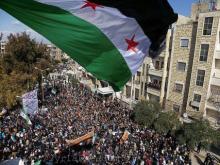
The Syrian civil war is increasingly drawing in nations across the Middle East, a regionwide conflict that threatens to pit world powers against each other and Muslim against Muslim.
On Wednesday, the United Nations Human Rights Council pushed through a resolution to investigate the abuses of the Syrian regime, over the objections of the regime’s ally Russia, who insisted the West was making matters worse.
U.S. Secretary of State John Kerry continued his travels in the region, trying to get all parties to agree to a peace conference in Geneva in the next few weeks. But councils representing the Syrian rebels again refused to join, demanding that representatives of Bashar Assad’s regime be banned.
In a war that is now clearly pitting the two main branches of the Islam — Sunni and Shiite Muslims — against one another, the dithering and differences between world powers is bringing about a desperate situation, according to experts.

What the heck is going on in Syria? If you are like me, you have a problem keeping all the players straight, and the unfamiliar Arab names don’t help. Thankfully, the Syrian president has a relatively easy name to remember, Bashar al-Assad, but keeping track of who’s who and which side they’re on is a real challenge. Frankly, even when I can keep track, I’m very skeptical that I am getting anything close to the truth from news outlets, the White House, or our State Department. The talk about a “red line,” no-fly zones, arming terrorists, and weapons of mass destruction sounds a lot like the falderal we were being fed going into the Iraq war. So what’s a good citizen of the world to do? If I can’t make sense of the news accounts myself, who can I find to help me out? And if I can’t trust my government to sort out the good guys from the bad guys for me, how can I ever figure out what, if anything, my government should be doing in my name?
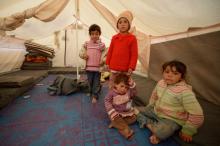
Our ministry with the Mafraq Church helped us see the desperate need for volunteers and funds to help the Church continue this vital ministry. Thousands of Syrians continue to make their way to Jordan fleeing the violence. Already more than 500,000 Syrian refugees live in Jordan. The refugee camps are overcrowded. We visited the Zatari Camp that has become home to more than 130,000 people. As far as the eye can see, the visitor can observe row after row of tents and small mobile units. The main street is packed with refugees while numerous shops, vendors, makeshift hospitals, and NGO distribution centers have sprung up in response to the plight of the refugees.
Other refugees are finding temporary residence in rooms, apartments, and warehouses in towns and cities outside the camp. The number of refugees in Mafraq has even surpassed the number of Jordanian residents. Church volunteers distributed basic items such as mattresses, blankets, small gas cookers, and gas containers. In addition, we delivered food baskets containing $50.00 worth of groceries to each family we visited.

Does violence rule our species? The barrage of international conflicts now in the headlines seems to suggest that violence may be the one language we have in common.
Though we all speak it fluently, very few of us learned it in school. We didn’t have to study its “vocabulary” and “grammar rules” – no, it was much easier than that. Humans pick violence up by immersion and so we are all native speakers. From Syria to Korea to Pakistan to Iraq to the U.S., the language of violence is so natural to us that we couldn’t recite one of its “grammar rules."
Sadly, ignorance of language rules does not diminish fluency. The odd thing is that if we stopped to learn the rules governing our fluency in violence, it would actually make us less fluent. Why? Because the rules of violence reveal an unpleasant reality: We don’t use violence; violence uses us.

Current and former U.S. officials have told the Los Angeles Times that the CIA is gathering intelligence on Islamic extremists in Syria as part of contingency planning for possible drone strikes. Although drone strikes have not been considered or authorized, according to the Times:
“The Counterterrorism Center, which runs the CIA’s covert drone killing program in Pakistan and Yemen, recently shifted several targeting officers to improve intelligence collection on militants in Syria who could pose a terrorist threat, the officials said.
“The targeting officers have formed a unit with colleagues who were tracking Al Qaeda operatives and fighters in Iraq. U.S. officials believe that some of these operatives have moved to Syria and joined Islamic militias battling to overthrow President Bashar Assad.
“The CIA effort, which involves assembling detailed dossiers on key militants, gives the White House both lethal and nonlethal options if it concludes that Syria’s 2-year-old civil war — which has caused 70,000 deaths, according to United Nations estimates — is creating a haven for terrorists.”

Current events, like much about our lives, frequently leave us hopeless, fearful, and uncertain. Religious faith isn’t a matter of wishing away these experiences; it involves perceiving God in the midst of our hardships.
I still remember one Friday night when I, an overly sensitive preteen, made a conscious decision to stop watching the nightly news with the rest of my family. I found what I saw too depressing and threatening: crime after crime, yet another house fire, economic challenges, too much Cold War.
I don’t recall how old I was when I mustered the willpower to face the news again on a regular basis. But a quick scan of the latest headlines makes me wonder why I still subject myself to it: the imminent and potentially crippling sequester, American drones flying in and out of Niger, Iran’s growing nuclear capability, recurring bloodshed in Syria. Maybe I had it easier back in middle school.

“Is not this the kind of fasting I have chosen: to lose the chains of injustice and untie the cords of the yoke, to set the oppressed free and break every yoke?” wrote the ancient prophet Isaiah (58:6). As Christians around the world enter the season of Lent, the challenge of the prophets is to not enter into empty rituals, but to recommit ourselves to fearless acts of justice.
This Lent Christians are standing in solidarity with Syrians by joining a rolling fast launched by Pax Christi International. The acute suffering of civilian communities in Syria has been made immeasurably worse by a shortage of bread, Syrian’s staple food, caused in part by the deliberate bombing of bakeries.
Open to anyone concerned about the anguish of local communities caught in Syria’s civil war, the campaign, called “Bread is Life – Fast for a Just Peace in Syria,” is a direct response to the fact that many Syrians feel abandoned by the rest of the world.